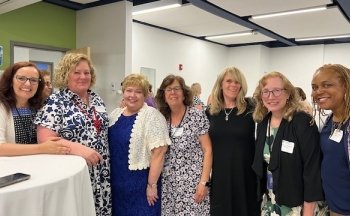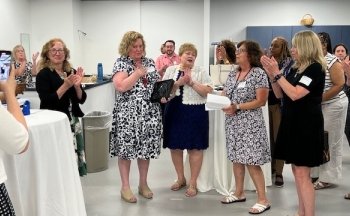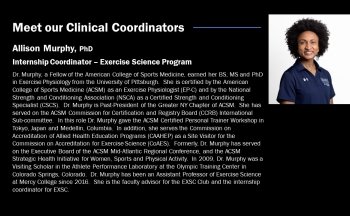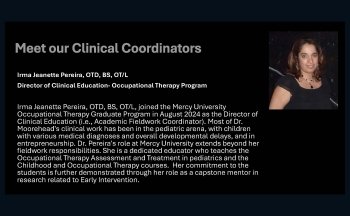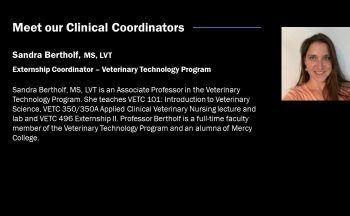
Clinical Education

Clinical Education Overview
All license qualifying health professional programs at Mercy University require students to complete clinical experiences in preparation for clinical practice. The information on this page will provide an overview of each program's clinical education requirements and opportunities. Please reach out to the clinical coordinators for additional information.
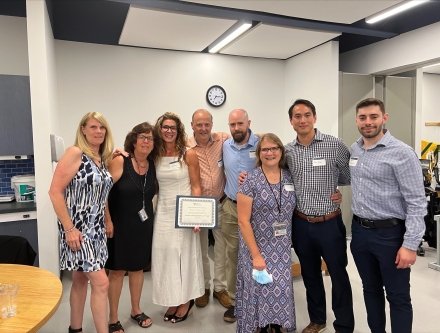
Clinical Education Appreciation
There is a saying ‘it takes a village to raise a child’. That phrase could be modified to say, ‘it takes a community to prepare a health care practitioner’. Your ongoing generous support of the clinical education components of our curriculums makes you a part of the Mercy University community. Students often comment on how clinical education experiences enrich their learning and are some of their most memorable experiences during their professional preparation. We appreciate your mentorship of our students and hope we will continue to collaborate in the preparation of future health care practitioners.
Clinical Educators Event 2024
Program Specific Information
Linda Sherman-Atkins
Lshermanatkins@mercy.edu
914-674-7366
Brief Overview of the Program:
At entry level, the medical laboratory scientist will possess the entry level competencies necessary to perform the full range of clinical laboratory tests in areas such as Clinical Chemistry, Hematology/Hemostasis, Immunology, Immunohematology/ Transfusion medicine, Microbiology, Urine and Body Fluid Analysis and Laboratory Operations, and other emerging diagnostics, and will play a role in the development and evaluation of test systems and interpretive algorithms.
The medical laboratory scientist will have diverse responsibilities in areas of analysis and clinical decision making, regulatory compliance with applicable regulations, education, and quality assurance/performance improvement wherever laboratory testing is researched, developed, or performed.
Clinical Laboratory Science students spend three semesters in their final year in a Medical Laboratory receiving professional training that leads to a defined, licensed profession.
Overview of Clinical Rotations (#, required population types, length, etc.):
Students will be completing internships in clinical laboratories Monday – Thursday 30 hours per week for a total of 30 weeks. The Laboratory Sections that each Clinical Laboratory Science student rotates through are as follows:
- CLSC 412 Hematology III – 6 weeks
- CLSC 417 Diagnostic Microbiology III – 6 weeks
- CLSC 407 Urinalysis II –2 weeks
- CLSC 426 Coagulation – 2 weeks
- CLSC 422 Clinical Chemistry III – 6 weeks
- CLSC 431 Immunohematology II – 6 weeks
- CLSC 435 Clinical Immunology – 2 weeks
Clinical Supervisor Qualifications:
Clinical Supervisors must possess a Bachelors Degree in Science, and at least one year of Clinical experience, plus a NY License as a Clinical Laboratory Technologist.
Clinical Supervision Requirements/Deliverables:
The Clinical Site Coordinator will be responsible for the planning and implementation of the student’s clinical education program. Additionally, they will evaluate the performance of the students in the medical laboratory regularly using the evaluation form supplied by Mercy University.
CLS Students will attend Clinical Monday – Thursday for 30 hours per week, for 30 weeks.
Dawn Cotter-Jenkins, MS, MA, CCC-SLP
dcotterjenkins@mercy.edu
914-674-7505
Brief Overview of the Program:
Mercy University's Graduate Communication Disorders program is a premier Master of Science program in Westchester and the metropolitan New York area. It is accredited by the Council on Academic Accreditation in Audiology and Speech-Language Pathology (CAA) of the American Speech-Language-Hearing Association (ASHA). The program is offered in a full time and part time format which can be completed in 2 and 3 years respectively. The program accepts a new cohort of approximately 48 students each year.
Overview of Clinical Rotations:
Students enrolled in the graduate CD program complete two clinical practicums in the on-campus Speech and Hearing Center (CMDS 620 Intro to Clinical Practicum in Speech Language Pathology and CMDS 621 Advanced In-House Clinical Practicum) and two off campus clinical practicums (CMDS 635 – School based Practicum in Speech Language Pathology and CMDS 630 – Clinical Practicum in Speech-Language Pathology III). They serve a variety of ages (pediatric through geriatric) and diagnoses throughout their clinical education. CMDS 635 serves as their school-based practicum in which they provide speech and language services for school age clientele.
Clinical Supervisor Qualifications:
Clinical supervisors must have their Certificate of Clinical Competence (CCC), be certified speech-language pathologists, and comply with the American Speech Language Hearing Association standards for supervision which includes additional continuing education credits and at least 9 months of clinical experience post clinical fellowship.
Clinical Supervision Requirements/Deliverables:
Clinical supervisors’ responsibilities include but are not limited to: Provide direct clinical supervision treatment sessions. Assist students to provide clinical services in a culturally competent manner, using client-centered and family-centered practices. Meet individually with student clinicians at least weekly and as needed. Includes planning and orientation for new cases. Provide both summative and formative constructive feedback to the student. Edit student clinical documentation. Schedule and complete student conferences at midterm and final. Ensure students have maintained accurate clinical records and clock hours (lesson plans, SOAP notes, treatment plans and progress reports). Approve clinic clock hours on Calipso. Evaluate students' clinical competencies on CALIPSO. Submit grade recommendations to the Clinic Director at midterm and final.
Allison Murphy
mmurphy37@mercy.edu
914-674-3052
Irma Pereira, OTD, OTR/L
ipereira1@mercy.edu
914-674-7813
Brief Overview of the Program:
The Graduate Program in Occupational Therapy is a full time 60-credit weekend program designed to prepare graduates to apply for licensure in Occupational Therapy and to be competent entry level practitioners. Classes are completed in 20 months and are followed by 24 weeks of full-time clinical fieldwork. A cohort of 35 students begins the Program every September.
The OT Program is organized via a lifespan model and is designed to help students understand and appreciate health, human performance, and the impact of disability or illness across the lifespan. The Program provides students with entry-level proficiency in occupational therapy practice with people of all ages, cultures, and disabilities. The Program places a strong emphasis on encouraging clinical reasoning and critical thinking and is designed to reinforce the self-directed learning style inherent in the professional role. The OT Program is committed to preparing practitioners who can competently fulfill responsibilities of the professional role within a changing health care world.
Overview of Clinical Rotations:
There are two levels of fieldwork within OT education. Level I Fieldwork experiences provide students with the opportunity to become familiar with varied settings in which occupational therapists practice. In the Mercy OT program, students complete four Level I Fieldwork experiences that align with the lifespan model of the program. Each of the Level 1 fieldwork experiences occur concurrently with the relevant course module within the fall and spring terms. Level 1 Fieldwork may include any combination of onsite or virtual practice environments, simulation activities, and asynchronous experiences.
Level II fieldwork experiences are completed full-time, typically for 12 weeks. The program seeks fieldwork sites that expose students to varied client populations across the lifespan, while addressing both the psychosocial and physical factors influencing engagement in occupation.
Clinical Supervisor Qualifications:
For Level I Fieldwork, OTs and other qualified personnel supervise our students based on the type of setting. Students are supervised by varied qualified personnel including licensed or otherwise regulated OTs and OTAs, physical therapists, psychologists, teachers, social workers, therapeutic recreation specialists, and child behavior specialists.
For Level II Fieldwork, accreditation standards require that students are supervised by a currently licensed or credentialed OT that has a minimum of 1 year of practice experience after initial certification.
Clinical Supervision Requirements/Deliverables:
During Level I Fieldwork experiences, clinical supervisors meet with students frequently to discuss and review the day’s caseload. The supervising therapist, whether an OT or of another discipline, provides valuable role modeling for the student. We ask that our supervisors provide the students with the opportunity to complete the assignments which align with the academic coursework. Clinical supervisors complete a weekly time sheet, and a final evaluation at the end of the four weeks.
During Level II fieldwork experiences, clinical supervisors meet with students frequently to provide structure, answer questions, and review the caseload. Students often work 1:1 with a clinical supervisor throughout the workday. Supervisors increase student level of responsibilities as students become more knowledgeable. The goal for a Level II fieldwork experience is that a student will be able to function as an entry level therapist at the conclusion of the assigned 12 weeks. Supervisors complete a weekly time sheet, midterm evaluation, and final evaluation.
Clinical supervisors earn professional development units to meet professional license and national certification renewal.
Jennifer Fernandes, MBA, OTA
Jfernandes5@mercy.edu
914-674-7831
Brief Overview of the Program:
The Mercy University OT Assistant Program is a full or part-time evening and weekend program designed to prepare its graduates to apply for certification and licensure as an occupational therapy assistant and to practice as an entry level generalist. The curriculum follows a developmental sequence with up to 35 students in each full-time cohort. Full-time students complete four semesters of didactic coursework that include two Level I fieldwork experiences, culminating with two full-time Level II fieldwork experiences in the final Summer and Fall terms. The program teaches its students to develop skills to successfully work in a variety of health care settings including hospitals, rehabilitation centers, schools, mental health facilities, and community centers.
Overview of Clinical Rotations:
Level I: Two 21-hour rotations, one associated with the pediatric and adolescent didactic coursework and one associated with adulthood and older adulthood didactic coursework. Level I fieldwork may include clinical visits, simulated learning experiences, or a combination of both.
Levell I: Two 8-week, full-time clinical rotations (16 weeks total). Students are assigned to two different clinical populations/sites.
Clinical Supervisor Qualifications:
Students completing their Level I experience (21 hours) may be supervised by currently licensed healthcare professional or otherwise regulated occupational therapists and occupational therapy assistants, psychologists, physician assistants, teachers, social workers, physicians, speech language pathologists, nurses, and physical therapists depending on the type of setting.
OTA student completing their Level II experience (8 -10weeks), supervision must be provided by a currently licensed or otherwise regulated occupational therapist or occupational therapy assistant (under the supervision of an occupational therapist) who has a minimum of 1 year full-time (or its equivalent) of practice experience as a licensed or otherwise regulated occupational therapist or occupational therapy assistant prior to the onset of the Level II fieldwork, according to accreditation standards.
Clinical Supervision Requirements/Deliverables:
OTA students are expected to meet specific entry-level learning criteria to pass fieldwork, as outlined by the American Occupational Therapy Association and the Accreditation Council of Occupational Therapy Education. Clinical educators are responsible for providing day-to-day oversight, feedback, and training to the OTA student. This includes but is not limited to instruction in clinical reasoning processes, administration of select assessments, implementation of interventions, documentation, professionalism, ethics, safety in clinical practice, billing, intra- and inter-professional collaboration, discharge planning, and the roles of the OTA applicable to the assigned clinical setting. Supervision is expected to be both formal and informal and ongoing daily/weekly to address the student’s learning needs. Students can be assigned additional learning projects based on the needs of the site and clients, and clinical educator’s judgment. Clinical educators complete a written evaluation of the student’s fieldwork performance at the midterm and final points of the clinical rotation.
Clinical supervisors earn professional development units to meet professional license and national certification renewal.
Lorraine Jamieson, DMSc, MHA, PA-C
ljamieson@mercy.edu
718-678-8946
Brief Overview of the Program:
The Mercy University Graduate Program in Physician Assistant Studies is designed to provide students with the skills needed to practice at an entry-level proficiency with their clinical supervisors while observing all appropriate ethical and legal boundaries. The Mercy PA Program is 27 months in length and includes the Clinical year which is 48 weeks in length. The didactic phase is divided into three semesters. Two basic science courses, Gross Anatomy and Pathophysiology, are taught during the first semester, as these courses serve as a foundation for the Physician Assistant Program curriculum. The basics of clinical medicine are taught during the second semester and includes Pharmacology I, Physical Diagnosis I, Fundamentals of Clinical Medicine II and Clinical Laboratory Procedures I and Gross Anatomy II. The study of Pharmacology and Clinical Medicine, Physical Diagnosis, and Clinical Laboratory Procedures continues into the third semester. Additionally, previous course content, Clinical Decision Making, and Problem Solving are reinforced. Each cohort consists of 60-65 students.
Overview of Clinical Rotations:
Physician Assistant students begin their clinical rotation during the second year of the program. Prior to starting clinical rotations, students are trained in patient interviewing and history-taking, performing a physical exam, generating a differential diagnosis list, and patient education. They also have experience in presenting patients and are encouraged to be active participants in formulating a patient treatment plan.
All students are assigned eight, 6-week rotations in Internal Medicine, Primary Care Medicine, General Pediatrics, General Surgery, Emergency Medicine, OB/GYN, Psychiatry, and an elective. Students generally provide care to the underserved population in the Bronx and neighboring Boroughs.
Clinical Supervisor Qualifications:
Clinical practice experiences occur with Physicians, Physician Assistants and Nurse Practitioner preceptors who are board certified or have appropriate experience in their area of instruction.
Clinical Supervision Requirements/Deliverables:
Clinical supervisors are required to provide a breadth of supervised clinical practice experience, to help students appreciate the differences in clinical approach. Preceptors are also expected to address the fundamental principles of varies disciplines as it relates to the clinical care of patients.
The deliverables include:
*Clinical objectives (due the first week of rotation),
*Mid evaluation (due at the end of the third week),
*Final evaluation (due at end of sixth week)
*Skills checklist is completed throughout the rotation.
Ruth Hansen, PhD, DPT, PT
rlhansen@mercy.edu
914-674-7824
Kathy Ryans, DPT, PT
kryans@mercy.edu
914-674-7826
Brief Overview of the Program:
The DPT program is fully accredited by Commission on Accreditation of Physical Therapy Education (CAPTE). The program takes 3 years and 3 months (10 trimesters) to complete, delivered in a full-time weekend format using a life-span approach. Cohort size ranges from 28-32 students/cohort.
Overview of Clinical Rotations:
Currently students complete three full-time, clinical experiences; one eight-week experience in the second year and two twelve-week experiences in the third year. Requirements include inpatient experience, outpatient experience, and a pediatric/adolescent and mature adult experience. Over the course of all three experiences students must get exposure to musculoskeletal, neurologic, cardiopulmonary and integumentary systems and to the lifespan (both younger and older client exposure).
Clinical Supervisor Qualifications:
Supervisors must be a licensed physical therapist with one-year post-licensure experience.
Clinical Supervision Requirements/Deliverables:
Clinical Instructors (CIs) must supervise the student gradually giving them more independence based on the student’s experience level and skill. CIs should provide feedback to students on a regular basis. The use of a weekly planning form (provided by the school) is strongly encouraged but not mandatory. CIs are responsible for completing a web- based written performance evaluation at the midpoint and final point of the experience. CIs are responsible for approving students’ attendance which will be emailed to them, and they just have to approve it via a click of a button at the end of each week. PTs can claim 0.5 hours of continuing education credit for each 2-weeks of student supervision.
Sandra Bertholf, MS, LVT
sbertholf@mercy.edu
(914) 674-7531
Programs
Undergraduate Programs
- Communication Disorders, Bachelor's Degree
- Exercise Science, Bachelor's Degree
- Occupational Therapy Assistant, Associate's Degree
- Veterinary Technology, Bachelor's Degree
Graduate Programs
- Communication Disorders, Master's Degree
- Occupational Therapy, Master's Degree
- Physical Therapy, D.P.T.
- Physician Assistant Studies, Master's Degree
Meet the Clinical Coordinators
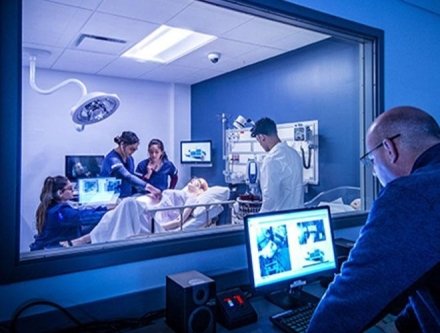
Clinical Simulation Labs
The Clinical Simulation Labs prepare students for their future as health care professionals. Spaces at the Dobbs Ferry and Bronx campuses comprise specialized labs designed to simulate different disciplines within a health care facility. The Labs include spaces resembling a hospital setting, rehabilitation clinic (adult and pediatrics), outpatient clinic, and home setting.

Interprofessional Education in Simulation Labs
Students from various health professions work with a simulated patient (a student actor from the University) in one of the simulation labs. These interprofessional experiences help students learn about other professions’ roles and responsibilities, values and ethics, and teamwork. These simulated experiences prepare them for their real-world clinical experiences.

